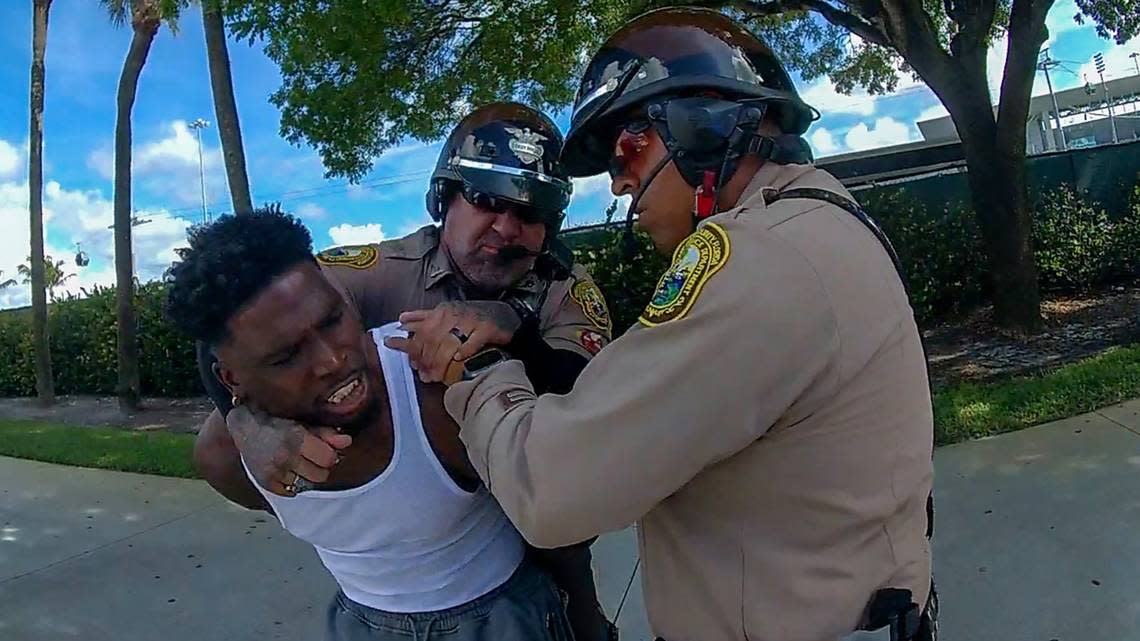A hunt for lessons after Tyreek Hill takedown: ‘We are thankful the cameras were there’

At a public library less than a mile from where county police threw Miami Dolphins wide receiver Tyreek Hill to the pavement over the weekend, a group of local Black leaders took turns on Wednesday sharing their thoughts on a Miami Gardens traffic stop that quickly became violent.
“These officers were concerned about not obeying the law as much as obeying me,” JS Rashid, an economic development consultant in Miami, told his fellow members of Miami-Dade County’s Black Affairs Advisory Board. “With African-American males, they dehumanize you. They make you lie on the ground, when they can very well let you stand up and talk.”
The volunteer Miami-Dade board meets regularly to discuss ways to improve circumstances for Black residents, who make up about 15% of the population in a county where more than two-thirds of people are Hispanic, according to Census data.
Fourteen board members gathered at the North Dade Regional Library in Miami Gardens for their regular monthly meeting, a location and time that just happened to place the proceedings within walking distance of where video of Hill’s takedown went global and drew condemnations of police misconduct. One Miami-Dade Police officer was placed on administrative leave on Sunday, and a county investigation is underway to see what discipline, if any, is warranted.
READ MORE: Tyreek Hill said he could have handled traffic stop better but calls for officer’s firing
The Black Affairs board has no role in any of that. But Wednesday’s agenda, already filled with items about housing in Liberty City and the annual “State of Black Miami” report, had a last-minute addition labeled “Police Relations: Tyreek Hill incident.”
No officers came to speak. Instead, members took turns offering their perspective on what they saw on the police body-camera footage released on Monday. There was also talk about what they hoped would come next after the global media attention dies down but existing tensions on race and policing and public safety remain.
“There should be a lesson learned from this episode,” said Tisa Thomson, a business consultant in Miami. “How can we make better relations with the police department?”
Board members didn’t lay out next steps in any detail, but several said they saw Hill’s treatment as the latest reminder of the dangers when emotions push a minor police encounter into something more serious.
“At any time did anybody try to de-escalate the situation?” asked Pierre Rutledge, an administrator in Miami-Dade’s school system and chair of the advisory board. “Nobody stood in the middle and said: ‘Hey, hey, hey. Wait a minute. Everybody calm down.’”
Rashid said he wanted the incident to be a warning to Miami-Dade Police and other agencies that officers need to be trained well ahead of time on how to handle difficult situations.
But board member Robert Malone, an educator, said he faulted Hill for his conduct in the stop and questioned why so much attention was devoted to a police encounter when Black males in the Miami area face a much bigger risk from gun violence.
“We still have this idea that law enforcement is out to get Black men in this community,” Malone said. “Yet still in this community young Black men continue to be shot down and killed by other young Black men.”
Hill had initially declined to roll down his window as the traffic stop began Sunday but did comply in handing over his license to the officer. When the officer returned, the window was up again.
After telling Hill the window needed to be down, an officer rapidly pulled him out of his sports car, saying he was done playing games. Hill told reporters on Wednesday he knows he could have been “better” during the stop, including with a quick roll down of his window. But he maintained his conduct didn’t justify the violent treatment from an officer who both pulled him out of his car onto the road and, minutes later, forced him down on the sidewalk from a standing position while he was handcuffed.
It was a moment captured in the multiple angles of footage provided by Miami-Dade’s requirement that officers wear body cameras, equipment first purchased in 2015 with the purpose of defusing tensions when civilians alleged mistreatment by police. After initially saying the footage of the Hill stop would remain confidential until an internal investigation concluded, the Miami-Dade Police Department released the video Monday night under pressure to make it public.
After the footage came out, the county’s mayor, Daniella Levine Cava, as well as both the Democratic and Republican candidates for Miami-Dade sheriff in the November election, criticized the police treatment of Hill.
“We’re just thankful the cameras were there,” board member Cliff Thomas, a healthcare consultant, said at the meeting.






